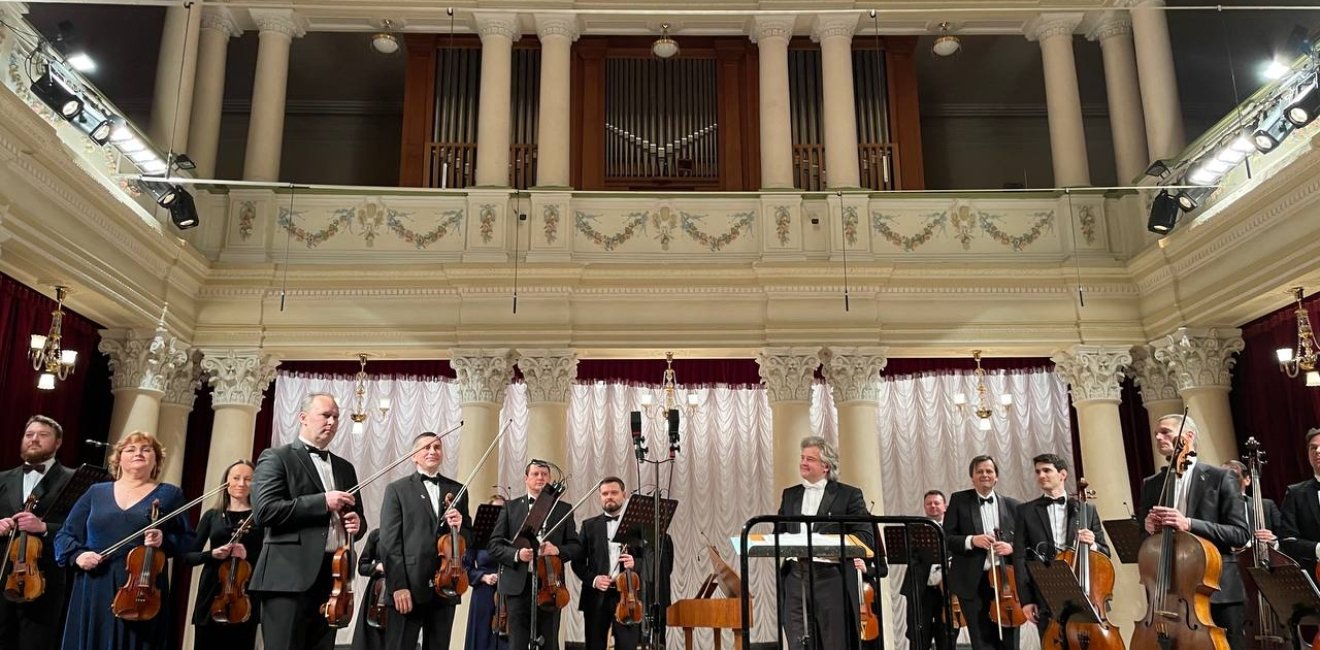
A blog of the Kennan Institute
Little in the world of classical music is more of a cliché than playing Vivaldi’s Four Seasons in April to mark the beginning of spring (except, perhaps, a performance of the Nutcracker by an American ballet company in December). A musical revelation when first performed in Venice around 1720, the four concertos, written to accompany four sonnets charting the seasons, have become among the most (over)performed pieces in the history of classical music. Nonetheless, there is little cliché about playing this delightful suite in a city at war, as the National Chamber Ensemble Kyiv Soloists did in April at the Ukrainian capital’s Freedom Hall.
Founded by virtuoso violinist Bohodar Kotorovych 25 years ago, the Kyiv Soloists have become one of the city’s cultural gems. Kotorovych reached out to bring together Ukrainian musicians who have won various national and international competitions together to showcase Ukrainian composers outside of Ukraine and international composers within Ukraine. The group continued following the founder’s death in 2009. Anatoli Vasyokovski became artistic director in 2017.
Since its founding, the ensemble has promoted a variety of styles, bringing top Ukrainian performers together with visiting international stars, such as pianist Claudio Martinez Mehner from Spain, jazz singer Nino Katamadze from Georgia, Deep Purple founder Jon Lord from England, and jazz pianist Konstanty Wileński from Poland. This eclectic mix of classical and nonclassical genres led to successful tours in Austria, France, Germany, Singapore, and many other countries over the past quarter century. The group’s reputation came to rest on founder Kortorovych’s maxim, “Many orchestras possess skill, but not every orchestra lifts your hearts high.”
The ensemble had just left Ukraine for a tour of Italy in February 2022 when the Russians launched their full-scale invasion. Many in the group had family members in Ukraine and the group debated how best to proceed. Eventually, they used their concerts to raise funds for the Ukraine war effort and continued their European “tour of pain.” Their Italian promoter added several unscheduled concerts within Italy and helped the group garner media attention for themselves and for Ukraine. Concerts in Switzerland and Germany followed, with a program including works by Ukrainian composers Valentin Silvestrov, Maxim Berezovsky, and Aleksandr Shymko. King Gustav and Queen Silvia of Sweden attend a televised performance in Stockholm where they were joined by pianist Benny Andersson of ABBA.
By mid-2022, the ensemble had begun performing in Kyiv again, coming together for concerts at several different venues. Lifting hearts high took on new meaning as the war with Russia unfolded. The group performed as often as possible in Kyiv, despite ongoing threats of aerial attack (which at times prompted mid-concert blackouts). As in the past, the group moved among venues, including classical concert halls and churches. The April performances of Vivaldi at Freedom Hall, near Kyiv’s riverside neighborhood of Podil, represents the sort of nontraditional venue Kyiv Soloists have found attractive for reaching new classical audiences. The Freedom Hall Cultural Center opened its doors in 1994 and was renovated in 2018. A commercial center, it has hosted concerts ranging from classical music to rock, provided space for conferences and meetings, and reached out to its surrounding community as a cultural resource.
The ensemble performed other concerts in April, but the familiarity of Vivaldi’s Four Seasons captured a need for classical comfort music amid the uncertainties of Russian attacks. These concertos signal the end of another harsh winter and the opening possibilities of spring, at a moment when Kyiv needs nothing more than to be reassured that life continues.
The opinions expressed in this article are those solely of the author and do not reflect the views of the Kennan Institute.
Author

Former Wilson Center Vice President for Programs (2014-2017); Director of the Comparative Urban Studies Program/Urban Sustainability Laboratory (1992-2017); Director of the Kennan Institute for Advanced Russian Studies (1989-2012) and Director of the Program on Global Sustainability and Resilience (2012-2014)

Kennan Institute
After more than 50 years as a vital part of the Wilson Center legacy, the Kennan Institute has become an independent think tank. You can find the current website for the Kennan Institute at kennaninstitute.org. Please look for future announcements about partnership activities between the Wilson Center and the Kennan Institute at Wilson Center Press Room. The Wilson Center is proud of its historic connection to the Kennan Institute and looks forward to supporting its activities as an independent center of knowledge. The Kennan Institute is committed to improving American understanding of Russia, Ukraine, Central Asia, the South Caucasus, and the surrounding region through research and exchange. Read more

Explore More in Focus Ukraine
Browse Focus Ukraine
Talking to the Dead to Heal the Living

Ukrainian Issue in Polish Elections


